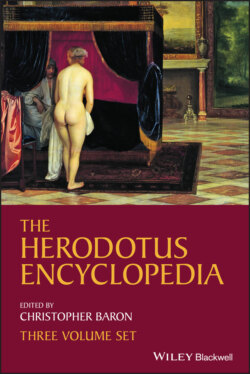Читать книгу The Herodotus Encyclopedia - Группа авторов - Страница 1040
BUBASTIS (Βούβαστις)
ОглавлениеR. DREW GRIFFITH
Queen’s University at Kingston, Ontario
1) An Egyptian city on the easternmost (Pelusiac) branch of the NILE Delta, securely identified as modern Tell Basṭa, just south of Zagazig (BA 74 F3). It is named after the goddess Bubastis (3), whom Egyptians called Bastet. The city is known in the Hebrew Bible as Pī‐bheseṭ (Ezekiel 30:17). Herodotus describes the annual feast of Bastet at the city, which is celebrated by a boat procession in bareis (Egyptian boats, see SHIPS AND SAILING) and by the RITUAL abuse (tōthasmos, see Rusten 1977, 161) of the city’s women by the worshippers (2.59–60). Herodotus describes the city’s Bastet‐temple in detail, proclaiming that there is “none more pleasurable to behold” (2.137.4–138).
2) The 18th administrative district (νομός, Egyptian sp˒ ͗t) of Lower EGYPT, which takes its Greek name from Bubastis (1), its capital (in Egyptian the nome was called Imty ḥnty, “Prince of the South”). Herodotus lists Bubastis as one source of men for the CALASIRIES, a group within the Egyptian warrior class (2.166.1).
3) The cat‐ or lion‐headed goddess Bastet (whom Herodotus equates on dubious grounds with ARTEMIS: 2.59, 137, 156), whose name in turn comes from b˒ ͗s, meaning “jar” (Gardiner 1957, 527).
SEE ALSO: Delta (Nile); Festivals; Insults; Temples and Sanctuaries
